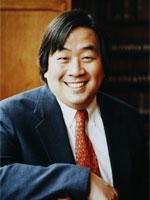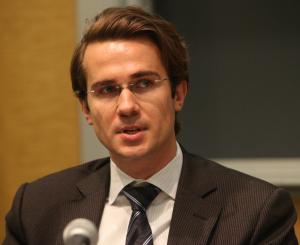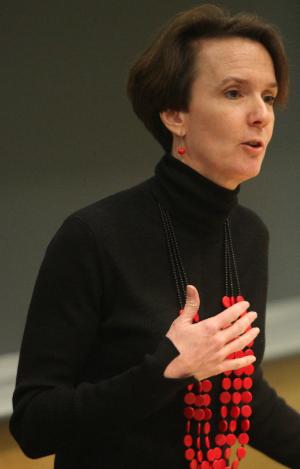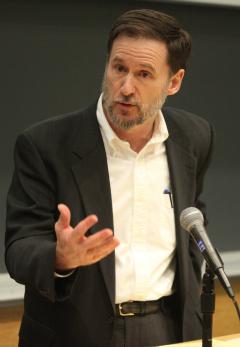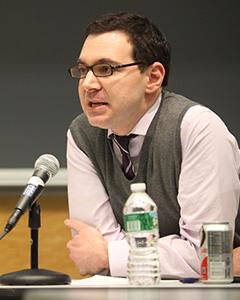Experts Outline International Law Priorities for President Obama's Second Term
Harold Hongju Koh, Former Legal Adviser to the U.S. Department of State, Says Obama is Using Diplomacy to Engage with Foreign Partners
New York, February 25, 2013—President Obama can strengthen America’s standing in the international community in his second term by modernizing human rights obligations, overcoming national resistance to foreign engagement, and building multilateral partnerships to maintain global influence, according to legal scholars who spoke at a recent Columbia Law School forum.
| Harold Hongju Koh |
The panel featured Harold Hongju Koh, who joined Columbia Law School as a visiting scholar in residence last month after serving more than three years as legal adviser of the U.S. Department of State. He pointed to some of the overarching strategies that could help the Obama administration achieve these goals.
“The administration is using many tools—not just hard power, but smart power,” which includes diplomatic and economic levers of influence, he said.
| Dr. Bart M.J. Szewczyk |
Koh was joined on the Jan. 31 panel, titled “International Law in Obama’s Second Term: Priorities and Problems” by Columbia Law School Professors Sarah H. Cleveland, Michael W. Doyle and Matthew C. Waxman, who each have held high-level government positions. Dr. Bart M.J. Szewczyk, an Associate-in-Law at Columbia Law School, moderated the discussion.
Obama is “pulling back from isolationism” and engaging with foreign governments through diplomacy, Koh said.
But this effort has met with major resistance from Congressional leaders who have consented to the ratification of only seven international treaties in the last four years, said Cleveland, the Louis Henkin Professor in Human and Constitutional Rights who served as the counselor on international law to Koh from 2009 to 2011.
| Professor Sarah H. Cleveland |
“That’s the lowest number in recorded U.S. history,” she said.
American influence abroad is in jeopardy, the panelists agreed, because of domestic resistance to engage in the international community for fear of relinquishing sovereignty and power.
The U.S. Senate failed to ratify the U.N. Convention on the Rights of Persons with Disabilities—modeled on the Americans with Disabilities Act—in December. Koh expressed hope that the vote reflected resistance to ratifying the treaty during the lame duck session, rather than broader opposition. But with that precedent, Cleveland suggested there was little hope for other human rights treaties. She pointed to the “long suffering” Convention on the Law of the Sea, which outlines the maritime rights and responsibilities of nations in international waters, as another challenging treaty to ratify in the current domestic climate.
As for military engagement in Obama’s second term, Koh pointed out that the use of drone strikes will likely continue in the fight against Al-Qaeda and associated forces. But he said the U.S. must better explain its legal case for military force by using “translation,” taking post-World War II treaties like the Geneva Conventions and principles of international humanitarian law and applying them to modern warfare.
| Professor Michael W. Doyle |
Doyle, the Harold Brown Professor of International Affairs, Law and Political Science who was assistant secretary-general and special adviser to United Nations Secretary-General Kofi Annan from 2001 to 2003, picked up on that theme, arguing that justification for the use of force needed to be better explained under international law. He stressed the importance of the Responsibility to Protect doctrine in securing the support of the international community for military intervention against Qaddafi’s regime to prevent humanitarian massacres in Libya.
Some important international treaties and norms have little meaning unless the U.S. has the ability and willingness to project power, said Waxman, who has served in senior positions at the U.S. State Department, the Department of Defense, and the National Security Council. He said he feared a diminished role of the U.S. in the world.
Some important international treaties and norms have little meaning unless the U.S. has the ability and willingness to project power, said Waxman, who has served in senior positions at the U.S. State Department, the Department of Defense, and the National Security Council. He said he feared a diminished role of the U.S. in the world.
“The retraction of American power would be very dangerous,” Waxman said, emphasizing what he called the “power of power.”
| Professor Matthew C. Waxman |
“A serious Responsibility to Protect without the United States’ capability and willingness to uphold and enforce it, will not exist,” he said, pointing out that freedom of the high seas has been “underwritten by the U.S. Navy” even though our country has not ratified the Convention on the Law of the Sea. He also warned that without U.S. power projection, human rights in some parts of the world would be not merely diminished but utterly “extinguished.”
Cleveland noted, however, that in some parts of the world, such as Arab Spring countries, leading with U.S. power is not effective, and that the U.S. must seek other approaches and partners.
Koh agreed the role the U.S. plays on the world stage is “indispensable.” He told the story of a foreign diplomat he worked with at the State Department who described the difference between his country and the U.S. The foreign diplomat said “when there is a problem in the world, Americans ask ‘what will we do?’” The diplomat then said, referring to his country, “and we ask, ‘what will the Americans do?’”
